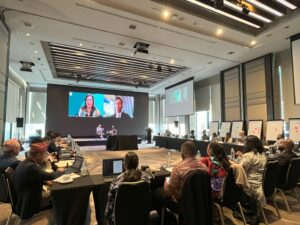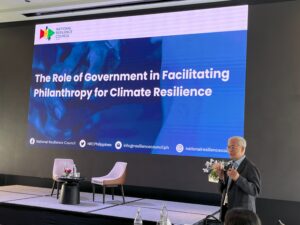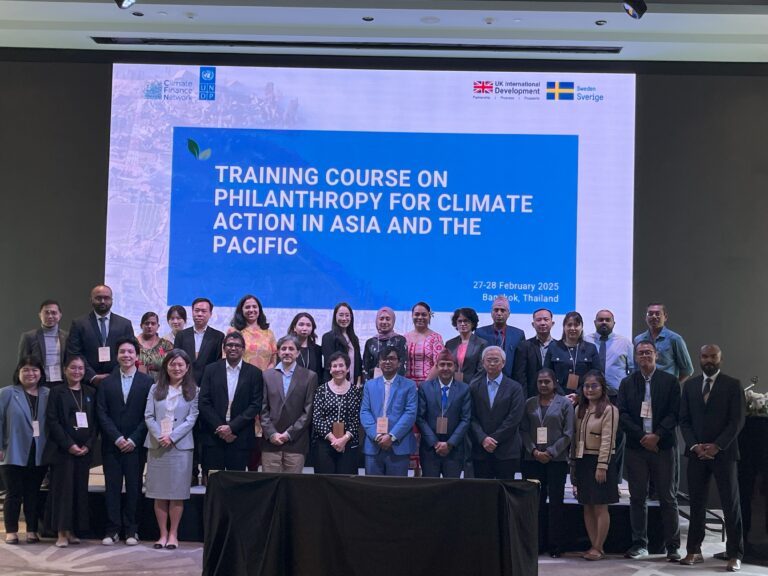A landmark regional training on philanthropy for climate action convened in Bangkok from 27–28 February 2025, uniting 24 government representatives from 12 Asia-Pacific nations alongside experts from philanthropic organizations and international development agencies. The event aimed to deepen understanding of how philanthropic capital can be leveraged to bridge climate finance gaps and support national climate strategies.
Hosted by the United Nations Development Programme (UNDP) through its Climate Finance Network (CFN), the training was supported by the UK’s Foreign, Commonwealth and Development Office (FCDO), the Swedish International Development Cooperation Agency (Sida), and facilitated by the Centre for Asian Philanthropy and Society (CAPS).
Participants hailed from Bangladesh, Cambodia, India, Indonesia, Laos, Malaysia, Maldives, Nepal, Fiji, the Philippines, Sri Lanka, and Thailand. They were joined by experts from UNDP’s Sustainable Finance Hub and prominent philanthropic institutions.
Reframing Philanthropy’s Role in Climate Finance
The two-day event served as a critical platform for cross-sector dialogue on how philanthropy can complement public and private finance in addressing the escalating climate crisis. Discussions centered on enabling policy environments, regulatory frameworks, and innovative financing mechanisms such as blended finance and public-private-philanthropy partnerships (PPPPs).
https://www.undp.org/asia-pacific/news/governments-and-philanthropic-leaders-convene-bangkok-advance-climate-finance-asia-pacific
“As public resources become increasingly stretched, tapping into philanthropic capital offers new opportunities to bridge climate finance gaps,” said Asad Maken, Regional Public Climate Finance Advisor at UNDP.
Deepali Khanna, Vice President of the Rockefeller Foundation’s Asia Regional Office, emphasized the importance of government alignment: “The government must be front and center in any work we do. Our role is to de-risk and unlock solutions that align with public priorities.”

Key Themes Explored
The training covered several core themes shaping the future of climate philanthropy in the region:
-
Government as an Enabler: Participants examined how legal frameworks, tax incentives, and policy tools can stimulate philanthropic contributions to climate goals.
-
Asian vs. Western Philanthropy: Experts highlighted the unique cultural and operational models of philanthropy in Asia-Pacific and their implications for climate funding.
-
Innovative Finance Tools: Sessions showcased approaches like debt-for-nature swaps, blended finance, and PPPPs as scalable models for mobilizing capital.
-
Alignment Challenges: Discussions addressed the need to ensure that philanthropic funds complement public and private investments rather than operating in silos.
-
Cross-Border Cooperation: Regulatory frameworks to facilitate transnational climate philanthropy were also a focus, promoting regional collaboration for resilience.
Notable Speakers and Practical Exchange
Key speakers included Deepali Khanna, Austere Panadero, and Jamshyd Godrej, who offered a recorded family foundation perspective. Dr. Jemilah Mahmood of Sunway University and representatives from UNDP shared insights on impact investment and blended finance.
The sessions blended presentations, interviews, and group discussions, fostering practical exchanges between funders, government representatives, and regional experts. Asad Maken opened and closed the training, framing the dialogue and highlighting actionable next steps.

Positive Outcomes and Forward Momentum
Participants expressed strong takeaways from the training, with 94% reporting improved understanding of the government’s role in enabling philanthropy and 87% noting a better grasp of integrating philanthropy into sustainable and climate finance.
Looking ahead, the emphasis is on translating insights into action. Participants agreed on the importance of coordinated policies and shared goals to ensure philanthropic investments support the most vulnerable communities and contribute to long-term climate resilience.
As Asia-Pacific nations ramp up efforts to close climate finance gaps, strengthened collaboration between governments and the philanthropic sector could play a transformative role in building a sustainable future.


